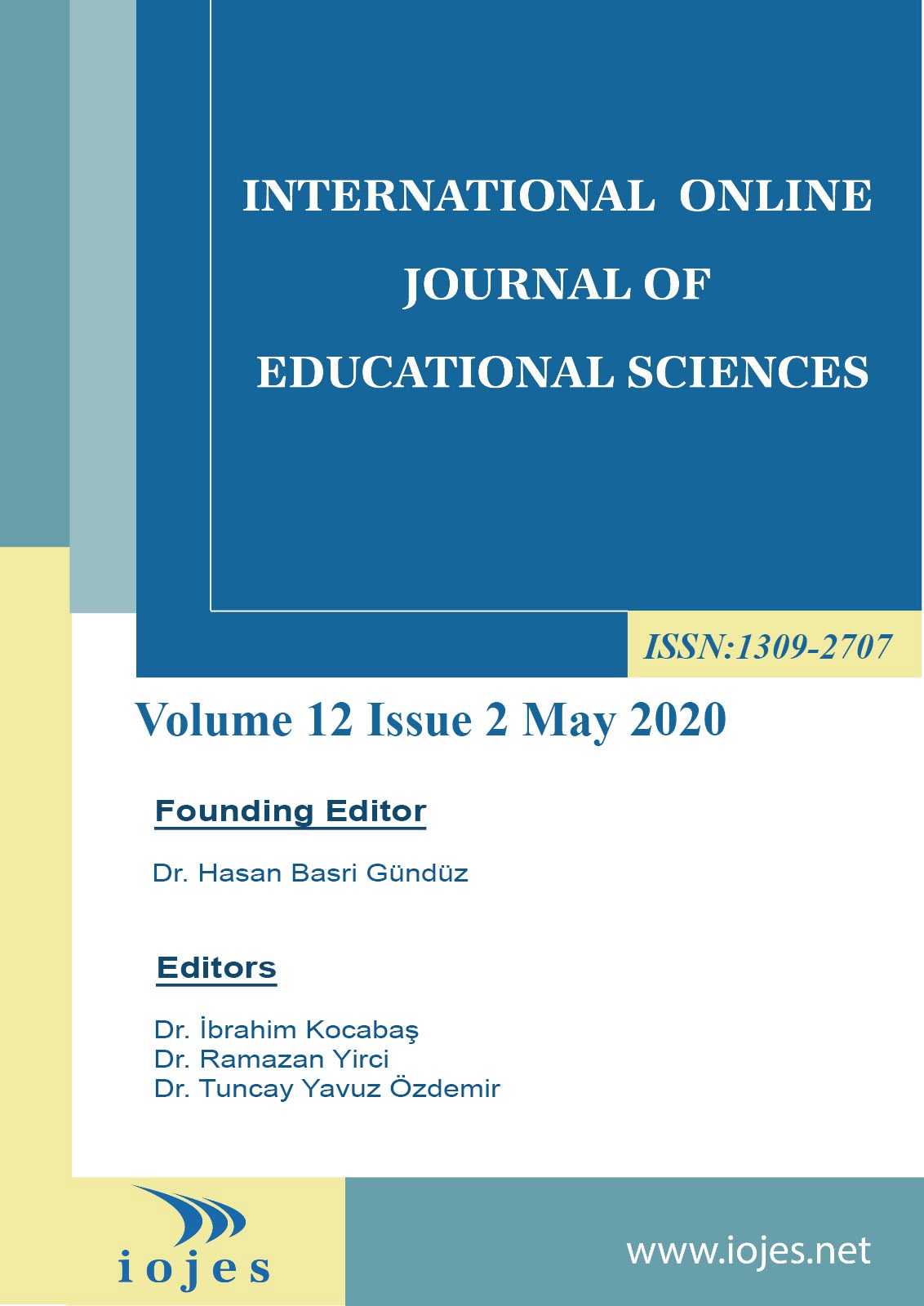Author :
Abstract
Keywords
Abstract
In this study, it is aimed to obtain knowledge and thoughts of secondary school students about energy resources. For this purpose, the research group consisting of 108 students from 10th, 11th and 12th grades in many different secondary schools in Istanbul was determined by purposive sampling method. In order to determine students' views on energy resources, a measurement tool consisting of open-ended questions was applied to the volunteer participants who wanted to participate to the research. For the purpose of the study, students were asked questions about energy resources. Before the implementation, the pilot test was used to test the intelligibility of the questions. Content analysis method was used for data analysis. Frequency and percentage (%) tables were created by creating codes according to the answers of the students. In order to ensure the reliability of the study, the data were also examined by a field expert and reliability was calculated by using the reliability formula of Miles and Huberman (1994). As a result of the data obtained, it is seen that students have knowledge about energy resources and possible damages of energy resources but their knowledge is not enough.
Keywords
- Aksan, Z. & Celikler, D. (2018). Opinions of pre-service science teachers about nuclear and thermal power plants. Pamukkale University Journal of Institute of Social Sciences, (32), 363-372.
- Aktamis, H. (2011). Determining energy saving behavior and energy awareness of secondary school students according to socio-demographic characteristics. Educational Research and Reviews, 6(3), 243-250.
- Atik, A., & Dogan, Y. (2019). High School Students' Views on Global Climate Change. Academy Journal of Educational Sciences, 3 (1), 84-100. DOI: 10.31805/acjes.569937
- Aydın, M., Dündar, R., & Korkut, Ş. (2016). Teacher views upon ecological literacy Education in Turkey. Abant İzzet Baysal University Journal of Faculty of Education, (16), 1160-1172.
- Bezen, S., Bayrak, C., & Aykutlu, I. (2016). Physics teachers’ views on teaching the concept of energy. Eurasian Journal of Educational Research, 64, 109-124.
- Büyüköztürk, Ş., Akgün, Ö. E., Demirel, F., Karadeniz, Ş., & Çakmak, E. K. (2016). Bilimsel Araştırma Yöntemleri. Ankara: Pegem Akademi.
- Cebesoy, Ü. B. & Karışan, D. (2017). Investigation of preservice science teachers’ knowledge, teaching efficacy perceptions and attitude towards renewable energy sources. Journal of Yüzüncü Yıl University Faculty of Education, 14(1), 1377-1415.
- Çoker, B., Çatlıoğlu, H., ve Birgin, O. (2010). Conceptions of students about renewable energy sources: A need to teach based on contextual approaches. Procedia-Social and Behavioral Sciences, 2(2), 1488-1492.
- Gelen, İ. (2017). P21- 21st century skill frameworks in curriculum and instruction (USA practices). Journal of Interdisciplinary Educational Research, 1(2), 15-29.
- Göcük, A. (2015). Probleme dayalı öğrenme yaklaşımı ile beşinci sınıf öğrencilerinde enerji okuryazarlığının geliştirilmesi. Yüksek Lisans Tezi, Marmara Üniversitesi, Eğitim Bilimleri Enstitüsü, İlköğretim Anabilim Dalı, İstanbul.
- Göcük, A. & Şahin, F. (2016). The effect of problem based learning on 5th grades students’ energy literacy. Journal of Human Sciences, 13(2), 3446-3468.
- Güven, G. & Sülün, Y. (2018). Investigation of the effect of the interdisciplinary instructional approach on pre- service science teachers’ cognitive structure about the concept of energy. Necatibey Faculty of Education Electronic Journal of Science and Mathematics Education, 12(1), 249-281.
- Kahyaoğlu, M. & Kaya, M. F. (2012). Teacher candidates’ views about environmental pollution and non- governmental organizations related to the environment. Journal of Educational Sciences Research, 2(1), 91107.
- Kanlı, İ. B. & Kaplan, B. (2018). A model suggestion for effıcient use of renewable energy sources urban energy cooperatives. Research Journal of Politics, Economics and Management, 6(4), 31-42.
- Karagöz, C. (2007). Kimya öğretmen adaylarının nükleer enerjiye karşı ilgi ve tutumları. Yüksek Lisans Tezi, Gazi Üniversitesi, Eğitim Bilimleri Enstitüsü, Ortaöğretim Fen ve Matematik Alanları Eğitimi Anabilim Dalı, Ankara.
- Miles, M. B. & Huberman, A.M. (1994). Qualitative data analysis: An expanded sourcebook, (2nd Edition), California: Sage Publications.
- Millî Eğitim Bakanlığı (MEB), (2018a). İlköğretim Fen Bilimleri Dersi (3, 4, 5, 6, 7 ve 8. Sınıflar) Öğretim Programı. Ankara.
- Millî Eğitim Bakanlığı (MEB), (2018b). Ortaöğretim Coğrafya Dersi (9, 10, 11 ve 12. Sınıflar) Öğretim Programı, Ankara
- Millî Eğitim Bakanlığı (MEB), (2018c). Ortaöğretim Kimya Dersi (9, 10, 11 ve 12. Sınıflar) Öğretim Programı, Ankara.
- Oral, M. & Özdemir, Ü. (2017). The Position of Turkey in Global Energy Geopolitics: Opportunities and Risks. Journal of History Culture and Art Research, 6(4), 948-959.
- Orhan Göksün, D. & Kurt, A. A. (2017). The Relationship Between Pre-Service Teachers’ Use of 21st Century Learner Skills and 21st Century Teacher Skills. Education and Science, 42(190), 107-130.
- Özdemir, M. (2010). Qualitative data analysis: a study on methodology problem in social sciences. Eskişehir Osmangazi University Journal of Social Sciences, 11(1), 323-343.
- Takmaz, S., Yılmaz, M., & Kalpaklı, F. (2018). Avatar as an instructional material in ecology education/environmental training. Pamukkale University Journal of Social Sciences Institute, (30), 249-263.
- Yalçın, S. (2018). 21st century skills and tools and approaches that are used to measure these skills. Ankara University Journal of Faculty of Educational Sciences, 51(1), 183-201.
- Yıldırım, A. & Şimşek, H. (2018). Sosyal bilimlerde nitel araştırma yöntemleri (11. Baskı). Seçkin Yayıncılık,
- Yıldırım, T., Tanık-Önal, N., & Büyük, U. (2019). Sekizinci sınıf öğrencilerinin yenilenebilir enerji kaynaklarına ilişkin algılarının bilim karikatürleri aracılığıyla incelenmesi. Kuramsal Eğitimbilim Dergisi [Journal of Theoretical Educational Science], 12(1), 342-368.
- Yıldız, Ş. (2011). Conceptual understanding and attitudes of teachers, prospective teachers and students towards sustainable environment (Master’s thesis, Dokuz Eylul University, İzmir, Turkey). Retrieved from http://hdl.handle.net/20.500.12397/7151
- Yürümezoğlu, K, Ayaz, S. & Çökelez, A., (2009). Grade 7-9 Students’ Perceptions of Energy and Related Concepts. Necatibey Faculty of Education Electronic Journal of Science and Mathematics Education, 3(2), 5273.





